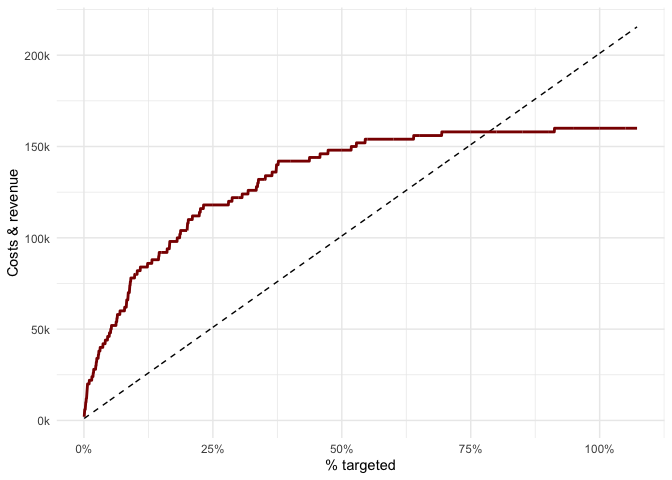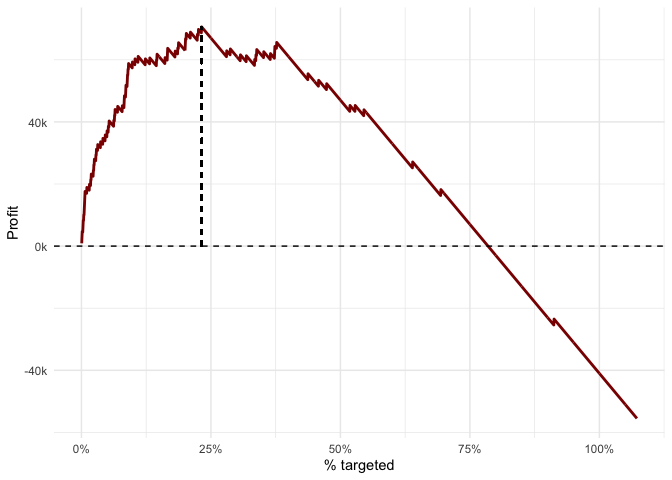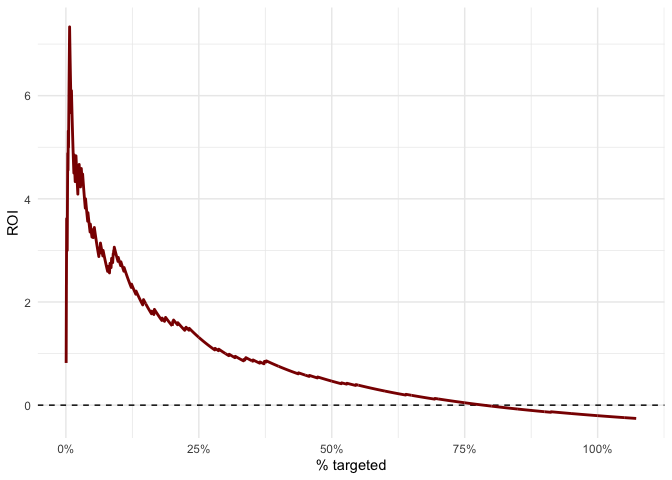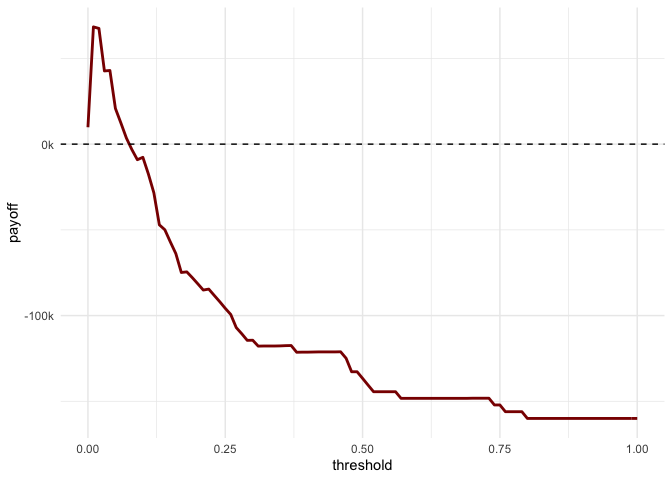Description
Functions to Assess the Business Impact of Churn Prediction Models.
Description
Calculate the financial impact of using a churn model in terms of cost, revenue, profit and return on investment.
README.md
modelimpact
This package is intended to help data scientists and decision-makers understand the potential value of churn prediction models depending on how many customers are being targeted by a campaign.
Installation
You can install the development version from GitHub with:
# install.packages("devtools")
devtools::install_github("PeerChristensen/modelimpact")
Functions and parameters
The first three functions aim to provide information about the business impact of using a model and targeting x % of the customer base. These functions accept the following arguments (required ones in bold):
x- a data framefixed_cost- fixed costs (defaults to 0)var_cost- variable costs (defaults to 0)tp_val- true positive value (defaults to 0)prob_col- the variable containing target class probabilitiestruth_colthe variable containing the actual class
profit_thresholds() accepts the following arguments:
x- a data framevar_cost- variable costsprob_accept- Probability of offer being accepted. Defaults to 1.tp_val- The average value of a True Positive.var_costis automatically subtracted.fp_val- The average cost of a False Positive.var_costis automatically subtracted.tn_val- The average cost of a True Negativesfn_val- The average cost of a False Negativesprob_col- The column with probabilities of the event of interesttruth_col- the column with the actual outcome/class. Possible values are ‘Yes’ and ‘No’
# Parameter settings
fixed_cost <- 1000
var_cost <- 100
tp_val <- 2000
Costs and revenue
library(modelimpact)
library(tidyverse)
library(scales)
head(predictions)
#> # A tibble: 6 x 4
#> predict No Yes Churn
#> <chr> <dbl> <dbl> <chr>
#> 1 No 0.996 0.00353 No
#> 2 No 0.983 0.0166 No
#> 3 No 0.993 0.00705 No
#> 4 No 0.981 0.0187 No
#> 5 No 0.894 0.106 No
#> 6 No 0.997 0.00254 No
cost_rev <- predictions %>%
cost_revenue(
fixed_cost = fixed_cost,
var_cost = var_cost,
tp_val = tp_val,
prob_col = Yes,
truth_col = Churn)
head(cost_rev)
#> # A tibble: 6 x 4
#> row pct cost_sum cum_rev
#> <int> <int> <dbl> <dbl>
#> 1 1 1 1100 2000
#> 2 2 1 1200 4000
#> 3 3 1 1300 6000
#> 4 4 1 1400 6000
#> 5 5 1 1500 6000
#> 6 6 1 1600 8000
# functions for formatting plotting axes
ks <- function (x) { number_format(accuracy = 1,
scale = 1/1000,
suffix = "k",
big.mark = ",")(x) }
pcts <- function (x) { percent_format(scale=1)((x / max(x)) * 100) }
theme_set(theme_minimal())
cost_rev %>%
ggplot() +
geom_line(aes(row,cost_sum), colour ="black",linetype="dashed") +
geom_line(aes(row,cum_rev), colour = "darkred",size=1) +
scale_y_continuous(labels = ks) +
scale_x_continuous(labels = pcts) +
labs(x = "% targeted",y = "Costs & revenue")

Profit
profit_df <- predictions %>%
profit(
fixed_cost = fixed_cost,
var_cost = var_cost,
tp_val = tp_val,
prob_col = Yes,
truth_col = Churn)
head(profit_df)
#> # A tibble: 6 x 3
#> row pct profit
#> <int> <int> <dbl>
#> 1 1 1 900
#> 2 2 1 2800
#> 3 3 1 4700
#> 4 4 1 4600
#> 5 5 1 4500
#> 6 6 1 6400
# max profit
max_profit <- profit_df %>% filter(profit == max(profit)) %>% select(row,pct,profit)
max_profit
#> # A tibble: 1 x 3
#> row pct profit
#> <int> <int> <dbl>
#> 1 464 22 70600
profit_df %>%
ggplot(aes(x=row,y=profit)) +
geom_line(colour = "darkred",size=1) +
scale_y_continuous(labels = ks) +
geom_segment(x = max_profit$row, y= 0,xend=max_profit$row,
yend = max_profit$profit, colour="black",linetype="dashed") +
geom_hline(yintercept = 0,colour="black", linetype="dashed") +
scale_x_continuous(labels = pcts) +
labs(x = "% targeted",y = "Profit")

Return on investment
roi_df <- predictions %>%
roi(
fixed_cost = fixed_cost,
var_cost = var_cost,
tp_val = tp_val,
prob_col = Yes,
truth_col = Churn)
head(roi_df)
#> # A tibble: 6 x 5
#> row pct cum_rev cost_sum roi
#> <int> <int> <dbl> <dbl> <dbl>
#> 1 1 1 2000 1100 0.818
#> 2 2 1 4000 1200 2.33
#> 3 3 1 6000 1300 3.62
#> 4 4 1 6000 1400 3.29
#> 5 5 1 6000 1500 3
#> 6 6 1 8000 1600 4
roi_df %>%
ggplot(aes(x=row,y=roi)) +
geom_hline(yintercept = 0,colour="black", linetype="dashed") +
geom_line(colour = "darkred",size=1) +
scale_x_continuous(labels = pcts) +
labs(x = "% targeted",y = "ROI")

Optimal threshold
thresholds <- predictions %>%
profit_thresholds(var_cost = 100,
prob_accept = .7,
tp_val = 2000,
fp_val = 0,
tn_val = 0,
fn_val = -2000,
prob_col = Yes,
truth_col = Churn)
head(thresholds)
#> # A tibble: 6 x 2
#> threshold payoff
#> <dbl> <dbl>
#> 1 0 9850
#> 2 0.01 68400
#> 3 0.02 67500
#> 4 0.03 42700
#> 5 0.04 42960
#> 6 0.05 20840
optimal_threshold <- thresholds %>% filter(payoff == max(payoff))
optimal_threshold
#> # A tibble: 1 x 2
#> threshold payoff
#> <dbl> <dbl>
#> 1 0.01 68400
thresholds %>%
ggplot(aes(x=threshold,y=payoff)) +
geom_line(color="darkred",size = 1) +
geom_hline(yintercept=0,linetype="dashed") +
scale_y_continuous(labels = ks)
